
The arrival of an Administrative Complaint from the Florida Department of Health (DOH) is, without question, the most serious professional challenge a physician can face. It signals an immediate, tangible threat to your license, your financial future, and your professional reputation.
You are not without recourse. This comprehensive guide will provide you with the necessary clarity, strategy, and authoritative legal reassurance to navigate the DOH process and mount a robust, solution-oriented defense.
Need medical doctor license defense? Call Elevate Legal Services, PLLCtoday on 561-770-3335 for a confidential consultation, or contact usto speak with an attorney about your case. You don’t have to go through this challenge on your own. With the right support and direction, you can move forward with confidence, stand up for your rights, and safeguard the career you’ve worked hard to build.
You’ll gain a mastery of the core violations under Florida Statute 458.331(1), a non-negotiable step-by-step action plan for the critical first 21 days, and an understanding of how the focused expertise of Elevate Legal Services, PLLC can protect your career.
What is an Administrative Complaint?

An Administrative Complaintis a formal legal document initiated by the Florida Department of Health (DOH) against a licensed professional, such as a nurse. It is an official, non-criminal accusation alleging the violation of specific professional or regulatory statutes.
Here’s what that means:This complaint officially launches the formal disciplinary process. The potential consequences are severe and include substantial fines, license suspension, or even the permanent revocation of your nursing license. A strategic, timely response is essential.
Understanding the Grounds for Complaint: Florida Statute 458.331(1)
Florida Statute 458.331(1)is the foundation for virtually all disciplinary actions against licensed Medical Doctors.
When the DOH issues a complaint, they are required to cite the specific subsection you are accused of violating. Knowing this specific charge is the crucial first step in building your defense.
A. Allegations of Medical Malpractice: Standard of Care (458.331(1)(t) and (x)
Subsections (t) and (x) address the gravest allegations: a failure to meet the standard of care, legally defined as medical malpractice.
Malpractice is not merely an adverse patient outcome. It is a deviation from the acceptable level of care that a reasonably prudent physician, under similar circumstances, would provide.
Complaints under these statutes demand rigorous defense, often involving complex medical and scientific evidence.
Common claims include surgical errors, misdiagnosis resulting in harm, improper prescribing protocols, or negligent post-operative care.
B. Failure to Maintain Proper Medical Records 458.331(1)(m)
In the administrative legal arena, your medical documentation is your primary defense. Subsection (m) focuses specifically on the integrity and completeness of your patient files.
The law mandates records that are not only legible but that fully justify and accurately document the entire course of treatment.
- The Documentation Mandate:Records must conform to strict standards, including those set by Florida Administrative Code Rule 64B8-9.003, which requires support for diagnoses and justification for care.
- High-Risk Errors:Issues frequently arise from incomplete operative notes, illegible handwriting, failure to document mandatory informed consent, or lapses in EMR entry protocols.
A well-documented record is often the difference between a successful defense and disciplinary action.
C. The Catch-All Provision for Rule Violations 458.331(1)(nn)
This broad statute is used by the DOH to address virtually any other violation of state healthcare laws or administrative rules.
It covers a multitude of issues that fall outside the specific scope of malpractice or recordkeeping.
Examples include improper delegation of duties, violation of specific administrative rules (e.g., those governing telemedicine), or a failure to comply with certain reporting requirements under Chapter 456.
The Critical First 21 Days: Your Legal Roadmap
The clock starts ticking the moment you receive the Administrative Complaint. This is a limited-time opportunity to control the narrative and shape the outcome.
Here is your non-negotiable action plan for the immediate future:
1. Contact DOH Defense Counsel Immediately.
Do not speak to DOH investigators, sign any documents, or attempt to submit a written explanation. You have the right to legal counsel, and exercising it is vital. Call our experienced attorneys immediately.
2. Review and Secure All Documentation.
Work only with your attorney to meticulously review the specific allegations. Secure all patient records, correspondence, and internal notes related to the case. Ensure no document is altered or deleted.
3. Strategize the Election of Rights Form.
This form dictates the entire legal path forward. Your choice must be strategic and informed:
- Formal Hearing:If you fundamentally challenge the factual allegations, your case is litigated before an Administrative Law Judge (ALJ) at the DOAH (Division of Administrative Hearings).
- Informal Hearing:If you accept the core facts but dispute the severity of the proposed penalty.
- Negotiated Settlement:Often the most effective strategy, where we negotiate directly with DOH counsel for a reduced sanction, a non-disciplinary outcome (like a Letter of Guidance), or even a dismissal.
Building a Solution-Oriented Defense Strategy
At Elevate Legal Services, PLLC, our focus is singular: preserving your medical license and minimizing the long-term impact on your career. Our strategic defense is customized to your facts.
The Role of Expert Witnesses in Defense
For malpractice allegations 458.331(1)(t) and (x), the DOH relies on expert opinion.
- We counteract this by securing reputable, independent medical experts who will assert that your care met or exceeded the prevailing standard.
- We meticulously cross-examine the DOH’s experts, challenging their methodologies, evidence, and conclusions.
Defending Against Documentation Allegations 458.331(1)(m)
 In documentation cases, we defend the record itself.
In documentation cases, we defend the record itself.
- We challenge the DOH’s interpretation of “legible” or “justified,” often demonstrating that any missing detail was immaterial and did not affect patient safety.
- If deficiencies exist, we focus on mitigation. We prove that you have taken immediate corrective action and implemented robust compliance training to prevent future issues.
Protecting Your Public Record and the NPDB
The most damaging consequence is the public reporting of discipline to the National Practitioner Data Bank (NPDB). This report can destroy credentialing, privileges, and insurance eligibility for years.
- Our primary goal in any negotiation is to achieve a result—such as a Letter of Guidance or a dismissal—that legally avoids being reported to the NPDB.
- We fight for outcomes that protect your professional reputation from permanent, public damage.
Frequently Asked Questions (FAQs)
Q1: What is the most immediate consequence of receiving the DOH Complaint?
The most immediate consequence is the activation of the 21-day deadline to file your Election of Rights. Failure to file this form correctly and on time can lead to a default judgment against you, severely limiting your defense options.
Q2: Is a DOH Administrative Complaint the same as a civil malpractice lawsuit?
No. A DOH Administrative Complaint is a regulatory action pursued by the state to discipline your license, which is governed by Chapter 458. A civil malpractice lawsuit is a private action for monetary damages, governed by civil court rules. However, a disciplinary finding can be used as evidence in a civil lawsuit.
Q3: How long does the DOH disciplinary process usually take?
The duration varies significantly. A case may be resolved quickly (6-12 months) through a negotiated settlement. If it proceeds to a Formal Hearing before DOAH, the process can often extend to 18 months or longer, depending on the complexity and scheduling demands.
Q4: If I admit fault, will the DOH penalty be lighter?
Not necessarily. While admitting fault (choosing an Informal Hearing) may streamline the process and demonstrate remorse, the penalty is still governed by the Board of Medicine’s penalty guidelines. A knowledgeable attorney can argue mitigating factors and negotiate for a substantially lighter penalty than you could achieve alone.
Q5: Can a DOH complaint affect my DEA registration or controlled substance prescribing?
Yes. If the DOH disciplinary action involves allegations of improper prescribing or a substance violation under Florida Statute 458.331(1)(s), the findings can be reported to the DEA. This could trigger a separate investigation or action regarding your controlled substance registration.
Q6: If I practice in multiple states, does a Florida DOH complaint affect my other licenses?
Yes, critically so. Disciplinary actions taken in Florida are typically reported to the NPDB, which all other state licensing boards monitor. Most states require you to report any disciplinary action taken in another jurisdiction, potentially leading to reciprocal discipline on your other licenses.
Take Control of Your Defense Today
Your career is the culmination of years of hard work, sacrifice, and dedication. Do not leave its fate to chance or inexperience.
The attorneys at Elevate Legal Services, PLLC, are focused solely on providing the authoritative, professional, and practical defense you need against the DOH. We understand the stakes are non-negotiable.
Take the essential first step now.
At Elevate Legal Services, PLLC, we provide aggressive defense. We are ready to listen to your story, answer your questions, and build the strong defense you deserve.
Contact us immediately at (561) 770-3335 or complete our confidential consultation online contact formto schedule your initial strategy session. Let us begin your medical doctor license defense today and take the first step toward protecting your license and securing your future.





